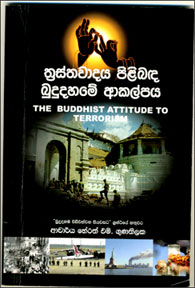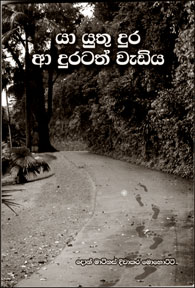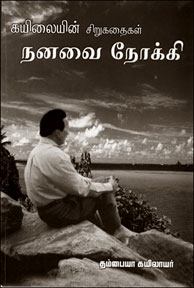|

A solution to the present day chaos?
by Lakmal Welabada
[email protected]
Terrorism which has ruptured the world is given different facets.
 Dr. Herath M. Gunathilaka in his book `The Buddhist Attitude to
Terrorism’ has tried to explore a new version as a solution to the
present day chaos in the world suffering from terrorism which has spread
like a cancer, and erupts like volcanoes almost everywhere. Dr. Herath M. Gunathilaka in his book `The Buddhist Attitude to
Terrorism’ has tried to explore a new version as a solution to the
present day chaos in the world suffering from terrorism which has spread
like a cancer, and erupts like volcanoes almost everywhere.
Buddhism is a practical code of ethics and some interpret it as a
philosophy. Whatever the interpretation it has, Buddhism defines how
worldly desires including greed, hatred, revengefulness, distress and
selfpitiness lead them towards destruction of terrorism.
Dr. Gunathilaka has made a great attempt to delineate this fact while
clearing the illusionary picture of degenerating Buddhist followers for
being the part of not allowing terrorism to raise its ugly head.
Giving examples and comparisons from the basics to the deep
description of the Buddhist doctrine with the destructive happenings of
today’s world, Dr.Gunathilaka is trying to diagnose the cause for the
problem and pass off a remedy.
He summarises a vast number of subjects into his 65 page book
including topics with social, economical, cultural, religious, political
and historical significance.
Buddhism explains worldly desires of a layman in three categories;
‘Kaama Thanha’ - the motivation which stimulate the man to act out of
greed which consists the desire to gratify his senses and sex. ‘Bhava
Thanha’ - the desire for self pursuits as man is motivated to crave for
the continuity of individuality and self existence or self preservation
with re-births in the ‘Sansara’.
‘Vibhava Thanha’ - the desire for destruction and the craving for
non-existence, which motivate man to act out of hatred which consists of
the desire to devastate or eliminate what he dislikes.
Dr. Gunathilaka explains how the Buddha has shown man’s craving lead
him to cause immense destruction not only to himself, but also to the
whole world body either being individual or as a well organised
movements like terrorist groups.
Whether it is past, present or future, until the man diminishes his
cravings, there will be war. The author has taken a tremendous endeavour
to present his paraphrase to world terrorism through Buddhism.
The Buddhist Attitude to Terrorism
Author - Dr. Herath M. Gunathilaka
Clues between the lines
Title: Christine
Author: Christine Spittel Wilson
Published by Perera Hussein Publishing House
A REVIEW by Jeanne Cambrai
 Christine Spittel Wilson’s autobiography CHRISTINE is not just a good
read but historically important. So often an autobiography disappoints
on some level. Christine Spittel Wilson’s autobiography CHRISTINE is not just a good
read but historically important. So often an autobiography disappoints
on some level.
Historical and other inaccuracies can drive you crazy. Even Lynn
Ludovyck’s THOSE LONG AFTERNOONS was a terrible disappointment to me
because it was so safe. I got no feel of Lynn himself - a man I had
known well all my life. Christine, however, is very much there in her
book and juggles the dual role of spectator and participant effortlessly
without padding, trivializing or pointing of fingers.
Hers is a complex story and, with the help of her diaries and
letters, she reconstructs in a tangible way a world which has
disappeared. She was born in 1913 into an age where very few people
expected serious turnarounds in their lifetimes. However, as she grew
up, the entire world went considerably berserk.
The Dutch Burghers were a very small clan even during colonial times
and most of us left the country when the Bandaranaike governments made
it impossible for us to carry out our professions in English.
Hers was a family that stayed but she has lived for years in England,
Scotland and Kenya and shorter spells in other countries, all of which
were going through political and social changes while she was there and
those changes affected her.
More than once her life was in danger so she had to learn to live
with and handle terror. She also learned that, wherever you are, friends
are waiting to be found at all levels. Christine Spittel was the first
child of Clarie van Dort and Richard L. Spittel.
Her parents are important to her story because it is the enforced
separations from them when she was young that set her life on its path.
Her credit list shows thirteen other books.
The best known SURGEON IN THE WILDERNESS is about her father. He was
a legend in his time - a surgeon, tropical disease specialist,
anthropologist, lover of the arts, and man of eclectic intellectual
pursuits which he shared generously with his daughter.
His gentle wife was also a scientist - they met in medical school in
Colombo and it was she who won the gold medal for surgery the year they
graduated together. From the first, it was her choice to put her own
career behind his - only helping him out when needed.
There are many short stories in this memoir and they cross from
tragedy - to comedy - to black comedy. I want to tell of them but don’t
want to spoil another reader’s fun.
These stories are never too long, but occasionally they seem too
brief. For example, her first words change Daphne duMaurier’s slightly
to read: Last night I dreamed I saw Kaira again. Kaira was the orphaned
Vedda boy her father brought her as a companion when, at about seven,
she started talking to herself.
It was not a successful experiment and she doesn’t explore the
reaction of his tribe, but Kaira never quite leaves this book, nor do
his jungle people. Earlier there are the tragic reasons she became so
lonely as a child and here again she tells what happened but ignores the
whys and wherefores.
On the other hand, she frequently leaves clues between the lines and
you see it is only details that have not been not laid out on a platter
- the information is really there. It is also there when she shifts into
the present tense as in the paragraph which starts, I am beating with
small impotent fists at a locked door ... and you feel her inability to
emotionally distance herself from what happened.
The next paragraph returns to the past tense and she is an adult
again - coolly reporting events. Perhaps I should just say, ‘Read this
book, there is a whole lot you didn’t know about this life and it is all
interesting.’
When you do, you will notice there are strong subplots such as how
your childhood sets you up to handle the real world, and how any really
serious illness draws people together.
And you will also notice that many of these vignettes are movie
material - by the kind of experts who directed HABLE CON ELLE (Speak to
Her) and THE PEREZ FAMILY in which ordinary people come up with
extraordinary solutions to the disasters they find themselves in.
A constant question gnawed at me throughout CHRISTINE. Did her
parents really mess up her life by sending her away to school in
England? Today, psychologists would insist they did, but there is no
evidence here of any permanent displacement.
She starts telling us about that time: I learned I was to go to
school in England. By ship. To be left there. Never to come home for the
holidays, and the dramatic mode shifts to Rodean and the holiday homes
she is put in when she is twelve.
The downside to such a separation from family is obvious. When she
returns to Ceylon after a six year absence, she is eighteen and has
become a stranger even to her parents. She is pretty, poised, but sawn
off emotionally and now has nothing in common with her old school
friends.
They are interested only in parties and clothes. She speaks with an
English accent, doesn’t know how to dance and has never been on a date.
She doesn’t want to hang out with them, she wants to go to the jungle
with her father. Not surprisingly she marries the first man who asks
her, and not surprisingly he is a playboy, rat and charmer and after a
few years she leaves him.
But the upside is that she returned home an open-minded world citizen
comfortable in any society. She still loves Sri Lanka and lives here.
She began to make her own decisions when she was still very young,
brought up her daughter Anne alone until she remarried and they remain
devoted to each other.
Her inner loneliness, which hangs like a cloud on much of this book
drove her to serious writing and later painting, and always she reaches
for nature, animals and books to heal her bleakest times.
No, she doesn’t get locked into misery or make the same mistakes over
and over. When her life suddenly changes course she is grateful and goes
with it. That happens when she meets Alistair Wilson, a British military
officer towards the end of World War II.
She is to later say of him, I always knew he was special. He is
Scottish, solid as a rock and movie-star good-looking (there are
pictures) and now she has someone to laugh with, as well as watch out
for her. Alistair’s presence expanded her horizons internationally and
also brought them into the corporate world.
She tells him after sixty years together, You are the most wonderful
person I have ever known. He replies, We make a good team. To have
written this autobiography in her nineties is a stunning achievement and
she has done it with style.
A lively dialogue
Title: Yayuthu dura aa duratath
vada vadi
Author: Divakara Mohotti
 Going through the book first chapter of “Yayuthu dura aa duratath
vadi” by Divakara Mohotti, I felt I was reading an autobiographical
novel by Truman Kapote. This work is full of lively dialogue. Going through the book first chapter of “Yayuthu dura aa duratath
vadi” by Divakara Mohotti, I felt I was reading an autobiographical
novel by Truman Kapote. This work is full of lively dialogue.
When I was reading the subsequent chapters, I felt as if I was going
through an anthropological survey of Kudaligama, a remote village in the
Kalutara District. Reading further, I got the impression that I was
going through the saga of the unique educational institute in Sri Lanka,
after the fashion of Shantinikethana in India, that is Sripali, Horana.
The great contribution of Sripali to the arts and crafts of Sri
Lanka, in short to the cultural development of Sri Lanka in the
twentieth century has been comprehensively depicted in this book.
Divakara Mohotti is the hero of the story while there are other
characters such as Wilmot Perera, Gunadasa Liyanage, Kalyani and Pamoda
revolve around the principal character.
The moral integrity of the protagonist is quite exemplary to the
students of modern society. Through this book the writer has granted
immortality to the village where he was born and the educational
institute where he was educated.
Various facets of the protagonist’s life; his childhood in the
village, school days, experiences as a journalist, falling in love and
bringing up children have been presented in an interesting manner in the
book.
The character of the protagonist’s grandfather had been graphically
depicted. The leadership in the village community, that prevailed in
ancient times is impressive. He stood against the popular wave and no
one in the village had the gumption to rise against him.
Among the other characters portrayed is that of Wilmot Perera. He was
a philanthropist, humanist, art lover and politician. A politician of a
different calibre, he utilized all his paternal wealth for the cause of
education and the arts. An aspect of his character hitherto unknown has
been laid bear in this book.
The writer has employed simple diction and style of writing is quite
lucid so that even a child could understand and appreciate the book.
- G. A. Mathupema.
“Not by hate is hate conquered”
Nanavai Norkkey
 A collection of short stories in Thamil titled “Nanavai Norkkey”
(Towards actuality) written by T. Kailayar, a Retired registered medical
officer is out now. A collection of short stories in Thamil titled “Nanavai Norkkey”
(Towards actuality) written by T. Kailayar, a Retired registered medical
officer is out now.
Fourteen short stories are included in the short story collection.
Some of them have already appeared in the local Thamil dailies, namely
Thinakaran and Thinakkural. Most of the short stories reflect the
author’s medical experience and contemporary issues.
“Nonavai Norkkey” is the title of the book as well at the headline of
the first story. It expresses the position of an internally displaced
father who undergoes open-heart surgery.
“Anpin Valiyathu” (path of love) is the tenth story. It gives a true
picture of the saying “Not by hate is hate conquered but by love”.
The main character in this story is a doctor who had worked in
Colombo for many years and leaves for Jaffna consequent to the 1983
riots. He comes to Colombo after a few months with a decision to request
for a transfer to Jaffna, failing which to resign from service to do
private practice.
“Nerkanal” (interview) is an instructive story. Beauty, education and
wealth are not the only factors that qualify one to enter into married
life, many other factors contribute to it. This is the theme conveyed
through this story.
-K. K. Arumainayagam. |
